-

新人教版高中英语必修3Unit 3 Diverse Cultures-Listening &Speaking&Talking教学设计
1. In Picture 1 and Picture 2, where do you think they are from? How do you know?From their wearings, we can know they are from ethnic minority of China--- Miao and Dong.Picture 1, they are playing their traditional instrument lusheng in their traditional costumes.Picture 2. the girls are Miao because they wear their traditional costumes and silver accessory.2. In Picture 3, can you find which village it is? What time is it in the picture?It is Dong village. It is at night. Step 2 While-listeningJustin met a new friend while traveling in Guizhou. Listen to their conversation and complete the summaries below.Part 1Justin and Wu Yue watched some Miao people play the lusheng. The instrument has a history of over 3,000 years and it is even mentioned in the oldest collection of Chinese poetry. Then they watched the lusheng dance. Justin wanted to buy some hand-made silver/traditional accessories as souvenirs. He was told that the price will depend on the percentage of silver. Part 2They will go to a pretty Dong minority village called Zhaoxing. they will see the drum towers and the wind and rain bridges. They may also see a performance of the Grand Song of the Dong people.Step 3 Post-listening---TalkingWork in groups. Imagine Justin is telling some friends about his trip to Guizhou. One of you is Justin and the rest of you are his friends. Ask Justin questions about his trip and experience. The following expressions may help you.

新人教版高中英语必修3Unit 3 Diverse Cultures-Reading and Thinking教学设计
Discuss these questions in groups.Q1: Have you ever been to a place that has a diverse culture ? What do you think about the culture diversity ?One culturally diverse place that I have been to is Harbin, the capital city of Heilongjiang Province. I went there last year with my family to see the Ice and Snow Festival, and I was amazed at how the culture as different to most other Chinese cities. There is a big Russian influence there, with beautiful Russian architecture and lots of interesting restaurants. I learnt that Harbin is called “the Oriental Moscow” and that many Russians settled there to help build the railway over 100 years ago.Q2: What are the benefits and challenges of cultural diversity ?The benefits: People are able to experience a wide variety of cultures, making their lives more interesting, and it can deepen the feelings for our national culture, it is also helpful for us to learn about other outstanding culture, which helps improve the ability to respect others. The challenges: People may have trouble communicating or understanding each other, and it may lead to disappearance of some civilizations and even make some people think “The western moon is rounder than his own.”Step 7 Post reading---RetellComplete the passage according to the text.Today, I arrived back in San Francisco, and it feels good (1) _____(be) back in the city again. The city succeeded in (2)_________ (rebuild) itself after the earthquake that (3)________ (occur) in 1906, and I stayed in the Mission District, enjoying some delicious noodles mixed with cultures. In the afternoon, I headed to a local museum (4)____ showed the historical changes in California. During the gold rush, many Chinese arrived, and some opened up shops and restaurants in Chinatown to earn a (5)_____ (live). Many others worked on (6)______ (farm), joined the gold rush, or went to build the railway that connected California to the east. The museum showed us (7)____ America was built by immigrants from (8)________ (difference) countries and cultures. In the evening, I went to Chinatown, and ate in a Cantonese restaurant that served food on (9)________(beauty) china plates. Tomorrow evening, I’m going to (10)__ jazz bar in the Richmond District. 答案:1. to be 2. rebuilding 3. occurred 4. that 5.living6. farms 7.how 8. different 9. beautiful 10. a

新人教版高中英语必修3Unit 5 The Value of Money- Discovering Useful Structure教学设计
Step 3 Meaning1. 过去将来时表示从过去某一时间来看将要发生的动作或存在的状态, 常用在宾语从句中。一般由“would/should +动词原形”构成。She hoped that they would meet again someday. 她希望将来有一天他们能再见面。2. was/were going to+动词原形: 表示过去将要发生或很有可能发生的动作, 常用于口语中, 表示预言、意图或者打算等。He was going to start work the following week. 他打算下星期开始工作。3. was/were about to do: 常用来表示即将发生的动作, “刚要/正要做……”。注意该结构不与任何时间状语连用。I felt that something terrible was about to happen. 我感到某种可怕的事情即将发生。4.was/were to do: 表示“曾计划做某事”, 如果表示“本来计划做某事, 动作没实现”, 则需用 “was/were to have done”。She said she was to have told me about the accident. 她说她本来想告诉我关于事故的事。5.Start, go, come, leave, see, meet等动词的过去进行时: 表示就过去某一时刻而言即将发生的动作。She was coming later. 她随后就来。I had just put on my overcoat and was leaving to visit a friend of mine. 我刚穿上外套要去看我的一个朋友。

新人教版高中英语必修3Unit 5 The Value of Money-Listening &Speaking&Talking教学设计
4. A:We’d like to have someone to say a word at the beginning to welcome the group.B:↙Who?A:We thought that you or Dr.Johnson might do it.B用降调说Who,其意思是问,对方想让谁在开场时致欢迎词。Step 6 Pronunciation---Practice1. Listen to the short conversation and mark the intonation with ↗, ↙ or ↙, ↗. Then discuss with a partner what they intend to convey by using different intonation.Owner: You know what ?↗ It’s a million-pound bank note↙.Waiter 1: Really ?↗(question)Waiter 2: Really !↙(unbelievable and surprised)Waiter 3: Really ?!↙↗(first question then surprised)2. Listen to the conversations. Underline the parts that are stressed and mark the intonation. Then talk about the implied meanings of the responses with different intonations. Listen again and repeat.1) Henry: It’s a nice suit.Owner: Oh, it’s perfect!↙(The intonation means it is very suitable for Henry.)2) Henry: Well, that’s very kind of you.Owner: Kind, sir ?↗(what you said is not right) No, it’s kind of you. You must come whenever you want and have whatever you like. Just having you sit here is a great honour !!↙(welcome you to come again)3)Henry:Well, to be honest, I have none. Oliver:(happily) What luck!(excited) Brother↗, what luck!↙(It means “Didn’t you hear it?”)Henry: Well, it may seem lucky to you but not to me!↗(angry) If this is your idea of some kind of joke, I don’t think it’s very funny. Now if you’ll excuse me, I ought to be on my way.↙(If so, I would leave.)Roderick: Please don’t go↙...(hope Henry can wait for a moment)Part B Viewing and Talking---Describe people’s changing attitudes in a film clipStep 1 Before-listening---Tell the filmYou are going to watch part of the film The Million Pound Bank Note. Look at these photos and guess what happens in the film.

新人教版高中英语必修3Unit 5 The Value of Money-Listening &Speaking教学设计
Step 4: Listen again and decide if the following statements are true (T) or false (F).1 It was the first time Chen Liyan's story was reported. T口 F口2 Chen found 10,000 yuan in a small plastic bag in Taiyuan railway station口 F口3 Wang Zheng apologized to Chen because he couldn't offer her more money. T口 F口4 Chen took out a large loan to cure her daughter, T口 F口5 Wang set up a fundraising website for Chen's daughter after Chen told him about her situation. T口 F口Step 5:After listening, discuss the questions.1 What kind of person do you think Chen Liyan is?Chen Liyan is generous and honest because she returned a large sum of money to the owner.2 Did Chen return the money because she didn't need it?No. She returned the money because it was the right thing to do. Evidence for this is that she refused to accept the reward money because she felt that it had not been earned. 3 Is it common for people to do what Chen did?It depends on the culture. In some countries it is quite common to return money that has been found. In other countries, people believe "Finders are keepers!" 4 How did Wang Zheng feel about the return of his money?He must have been very happy and relieved to have gotten his money back. We know this because he thanked Chen repeatedly and even offered her a reward.5 Why did Ma Dongbao tell Wang about Chen's family?He must have had great sympathy for Chen and her daughter and wanted to help them.'We know this because he arranged help for them. 6 How did the news reporter feel about Chen's actions?The news reporter felt that it showed that money wasn't the most important thing in life. We know this because the reporter told us that this is what Chen believes. and then said, “that's a great attitude to take."

新人教版高中英语必修3Unit 5 The value of money-Reading and Thinking教学设计二
? Could you offer me some kind of work here?? I don’t want your charity, I just want an honest job.? Careless: I landed in Britain by accident.Step 7:Consolidation.? Find Henry? Roderick and Oliver were I .making a bet when they saw Henry, a poor young man. ? Know Henry? About a month ago, Henry was sailing and later he found himself carried out to sea by a strong wind. Fortunately, he 2.was spotted by a ship. And it was the ship that brought him to 3.England? Offer money to Henry ? Oliver and Roderick gave Henry a letter and told him that there was money in it. They 4.persuaded him to accept it, and made him 5.promise that it wouldn't be opened until 2 o'clock.Step 8:Language pointsa large amount of: a large quantity of; a great deal ofe.g. They bought a large amount of furniture before they moved their new house.make a bet: make an arrangement to risk money, etc. on an event of which the result is doubtful.e.g. We made a bet on the result of the match.permit sb to do something: allow somebody to do somethinge.g. My mother doesn’t permit me to ride in the street after it rained.by accident: as a result of chancee.g. I only found it by accident.stare at: look at somebody or something with the eyes wide open in a fixed gaze( in astonishment, wonder, fear, etc)to be honest: to tell you the truth; to be franke.g. To be honest, I don’t think we have a chance of winning.Step7 Homework:What do you think will happen to Henry? Will the bank-note help him or get him into trouble?

新人教版高中英语必修3Unit 5 The Value of Money-Reading and Thinking教学设计一
Everybody wants to get wealth.In today’s material world,making money or becoming wealthy symbolizes a person’s success and capability. Many people just make every effort, pay any price to attain greater wealth. With money,they can buy nice, large apartments in nice neighborhood. With money they can own luxurious cars. Wealth seems to bring all happiness in life.But is wealth the only road to happiness? Not really. There are many things in the world, which are beyond the means of money, such as friendship, love, health and knowledge. People are so preoccupied with struggling for money that they have no time or would not take the time to form or maintain friendship. What happiness can they feel living as lonely miserable creatures without love or friends in the world even if they accumulate tremendous wealth?In my opinion, people can’t do anything without money, but money is not everything. What money will bring you depends on your personal belief and goal in life. If you are kind enough to help others, especially the poor, money is a good thing to you. With it, you can do much more for the benefit of people and your country, and it will add to your own happiness. If you want money just for your own needs, you’ll never be satisfied or happy. In a word,you should have money spent for more people. Only then can money be the source of your happiness.Step 8 Homework4 students in a group, one acts Roderick, one Oliver, one servant and the fourth one acts Henry Adams, then listen to the tape, pay more attention to the difference between American English and British English in pronunciation, stress, tone.

新人教版高中英语必修3Unit 5 The Value of Money-Reading for Writing教学设计二
2. 您能看到, 我头发太长了。You can see that my hair is much too long.3. 无论什么时候, 只要您想回来就回来。Please come back whenever you want.4. 您仅有很少的头发要理! You only have too little hair to cut !5. 为您服务是我的荣幸!It is my honour to serve you!Step 9 Writing(Henry is walking down the street when he sees a sign for a place that cuts hair. He decides to have it cut. )H=Henry B=BarberH: Good afternoon, I’d like to have my hair cut, if I may. (The barber looks at Henry’s hair and continues cutting another man’s hair. ) Er, I’d really like a haircut. As you can see it’s much too long. B: (in a rude manner) Yes, I can see that. Indeed, I can. H: Fine, well, I’ll have a seat then. (He sits in one of the barber’s chairs. The barber turns to look at Henry. )B: It’s quite expensive here, you know! Are you sure you can afford it?H: Yes. I think so. (After his hair is cut, the barber tells Henry how much he must pay. Henry shows the barber the bank note. )B: Why Mr. . . (looks shocked)H: Adams. Henry Adams. I’m sorry. I don’t have any change. B: Please don’t worry! (wearing a big smile) Nothing to worry about! Nothing at all! Please come back whenever you want, even if you only have too little hair to cut! It will be my honour to serve you!Step 10 Pair workExchange drafts with a partner. Use this checklist to help your partner revise his/her draft.1. Are all the elements of a play included and in good order ?2. Do the character use suitable language ?3. Are the stage directions clear and useful ?4. Is the plot clear and exciting enough ?

新人教版高中英语必修3Unit 5 the value of money-Reading For Writing教学设计一
【参考范文】Narrator:(Henry is smiling as he leaves the restaurant. As he is walking down the street, he sees a sign for a place that cuts hair. He decides to get it cut. )H=Henry;B=Barber;R=rude manH:Good afternoon, I'd like to get a cut, if I may. (The barber looks at Henry's hair and continues cutting another man's hair. )Er, I'd really like a haircut. As you can see it's much too long. B:(in a rude manner) Yes, I can see that. Indeed, I can. H:Fine, well I'll have a seat then. (He sits in one of the barber's chairs. The barber turns to look at Henry. )B:It's quite expensive here, you know!Are you sure you can afford it?H:Yes. I think so. (In comes the rude man. )R:Hey you there. I need a haircut quickly. Can you do me straightaway?B:All right, then, get in the chair and I'll see what I can do. R:Thank you. (sits down in one of the barber's chairs)H:Excuse me, but I was here first. Aren't you going to do my hair first?B:This man's in a hurry. H:Well so am I!I insist that you cut my hair first. B:OK, but I'll have to be quick. This gentleman is waiting. H:Thank you. (They both become quiet. After his hair is cut, the barber tells Henry how much he must pay. Henry shows the barber the bank note. )B:Why, Mr . . . (looks shocked)H:Adams. Henry Adams. I'm sorry, I don't have any change. R:You're that Mr Adams! Well,I'm glad I waited or I might never have known it was you. B:Why, Mr Adams, please don't worry!(wearing a big smile) Nothing to worry about!Nothing at all!Please come back any time, even if you only need too little hairs cut!It will be my honour to serve you!
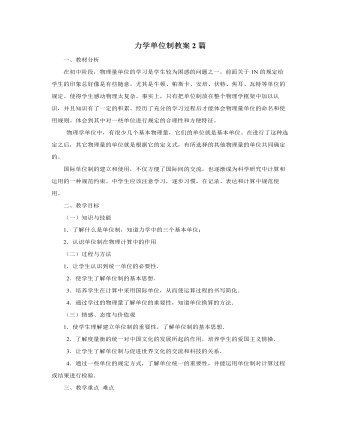
人教版新课标高中物理必修1力学单位制教案2篇
一、教材分析在初中阶段,物理量单位的学习是学生较为困惑的问题之一。前面关于1N的规定给学生的印象总好像是有些随意。尤其是牛顿、帕斯卡、安培、伏特、焦耳、瓦特等单位的规定。使得学生感动物理太复杂。事实上,只有把单位制放在整个物理学框架中加以认识,并且知识有了一定的积累。经历了充分的学习过程后才能体会物理量单位的命名和使用规则。体会到其中对一些单位进行规定的合理性和方便特征。物理学单位中,有很少几个基本物理量,它们的单位就是基本单位。在进行了这种选定之后,其它物理量的单位就是根据它的定义式,有所选择的其他物理量的单位共同确定的。国际单位制的建立和使用,不仅方便了国际间的交流,也逐渐成为科学研究中计算和运用的一种规范约束。中学生应该注意学习,逐步习惯,在记录、表达和计算中规范使用。二、教学目标(一)知识与技能1.了解什么是单位制,知道力学中的三个基本单位;2.认识单位制在物理计算中的作用
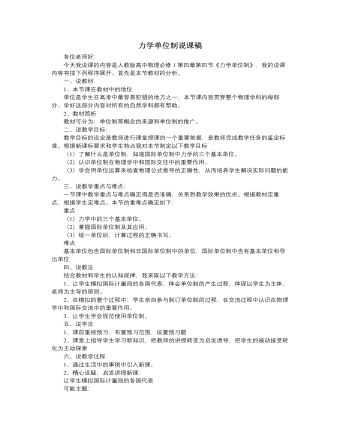
人教版新课标高中物理必修1力学单位制说课稿
今天我说课的内容是人教版高中物理必修1第四章第四节《力学单位制》,我的说课内容将按下列程序展开。首先是本节教材的分析。一、说教材1、本节课在教材中的地位单位是学生在高考中最容易犯错的地方之一,本节课内容贯穿整个物理学科的每部分。学好这部分内容对所有的自然学科都有帮助。2、教材简析教材可分为:单位制等概念的来源和单位制的推广。二、说教学目标:教学目标的设定是教师进行课堂授课的一个重要依据,是教师完成教学任务的鉴定标准。根据新课标要求和学生特点我对本节制定以下教学目标(1)了解什么是单位制,知道国际单位制中力学的三个基本单位。(2)认识单位制在物理学中和国际交往中的重要作用。(3)学会用单位运算来检查物理公式推导的正确性,从而培养学生解决实际问题的能力。
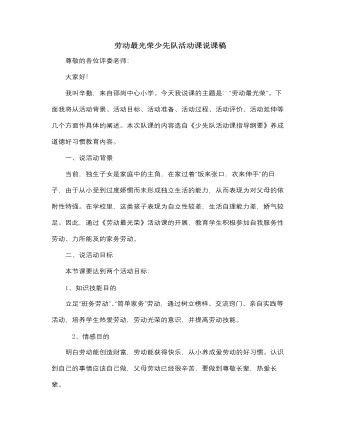
人音版小学音乐一年级上劳动最光荣少先队活动课说课稿
4、争当班级小主人,为集体出力(建立班集体岗位责任制)五、说活动评价评价激励手段辅导员评价:主要以班级发展主题图中的奖励为主。队员评价:过程评价以星和小奖章记录为主。六、说活动延伸?课后各小组建立岗位责任制,全班每个同学都负责一个地方,承担一个责任,由小组长负责和组员讨论如何划分责任区。下周开始执行。最后我想,我们少先队活动课最大的特点就是在活动中体验、在活动中成长。活动全程,队员们的组织能力、观察能力、思考能力、统计能力、团队合作能力、生活能力都得到了锻炼与成长,这就是我们组织少先队活动最大的收获。我们有责任和义务开展好少先队活动课,真正的实现以学生为中心,为学生的长远发展负责,使少先队活动课真正成为育人、育心的课程,更好的为生活服务。以上,就是我对《劳动最光荣》这节少先队活动课的阐述。存在的不足之处还恳请各位评委老师批评指正。谢谢大家!
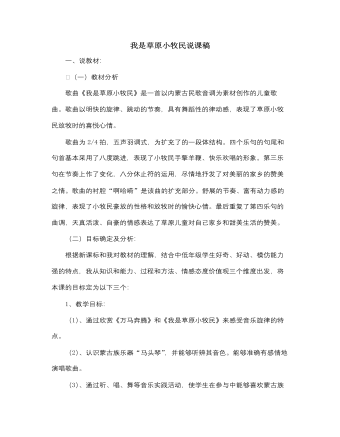
人音版小学音乐三年级上册我是草原小牧民说课稿
4、读歌词:老师带领同学有感情的朗读两边歌词。5、解决难点:二分音符和附点四分音符的节奏练习。6、教师范唱歌曲:7、学生演唱歌曲:老师找出学生唱的不准确的地方。8、教师指导学生演唱:通过老师和学生的对比唱来改正学生的错误。9、师生接唱。10、男女生接唱。师:歌词中说到我是草原小牧民,手拿扬鞭多自豪!那么我们在唱这首歌的时候应该用怎样的情绪呢?11、学生齐唱歌曲 :(三)、拓展部分:1、观看课件蒙古族的民俗:师:同学们这是一首蒙古族的民歌,同学们对蒙古族有哪些了解呢?2、欣赏《筷子舞》:师:可以看出蒙古族是一个能歌善舞的民族,让我们一起来欣赏一段具有蒙古族代表的舞蹈《筷子舞》吧!3、师表演筷子舞:师:同学们看老师给你们带来了什么?生:筷子。师:老师还给同学们准备了一段筷子舞想看吗?那就给老师点掌声吧!
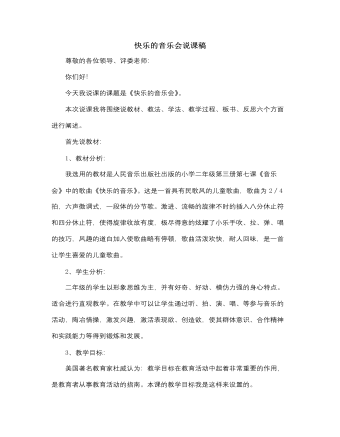
人音版小学音乐二年级上册快乐的音乐会说课稿
新课标中鼓励音乐创造,注重个性发展,教师应为学生提供发展个性的可能和空间。在这一环节中我以这样一句话:“嘘,别出声,我好像听到谁在叫我,引出小鸡,小鸭加入到我们都行列中来”导入。现在,能不能像老师一样,把这些小动物的声音编成歌词,创作出一首新的主题曲?谁来试试?”学生创编好歌词说:“小朋友们让我们,随着欢快的音乐唱起来、跳起来吧!”来举办一场快乐的音乐会。五、说板书根据本课的教学目标和教学重难点我的板书是这样设计的。板书课题引起学生注意,让学生知道本节课的教学内容;板书难点是为了达到突破难点的目的。六、说反思本课我以“快乐”为主线,贯穿全课。在课堂上体现了以教师为主导,学生为主线的教学理念,实现了合作探究式的学习方法。回顾整个教学环节,在拓展创编这一环节中,由于时间有限,我把学生局限于我预设的几种动物和乐器上,对学生的想象力有些限制。今后,我将力所能及的做到符合学生实际来设计教学。
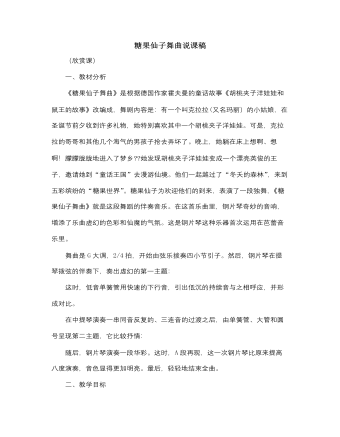
人音版小学音乐二年级上册糖果仙子舞曲说课稿
在中提琴演奏一串同音反复的、三连音的过渡之后,由单簧管、大管和圆号呈现第二主题,它比较抒情:随后,钢片琴演奏一段华彩。这时,A段再现,这一次钢片琴比原来提高八度演奏,音色显得更加明亮。最后,轻轻地结束全曲。二、教学目标初步了解芭蕾舞剧,感受《糖果仙子舞曲》优美的情绪。三、教学重难点教学重点对乐曲进行体验实践,听辨乐曲的情绪。教学难点听辨不同乐器的音色特点。四、教学过程(一)导入播放《糖果仙子舞曲》,学生听辨音乐的情绪(优美动听)(二)感受乐曲导语:《糖果仙子舞曲》是舞剧《胡桃夹子》中糖果仙子一个人的独舞,我们来了解一下《糖果仙子舞曲》的故事。1.芭蕾舞剧《胡桃夹子》简介教师结合图片,简单讲述童话故事《胡桃夹子》以及芭蕾舞剧的特点。2.再次欣赏乐曲《糖果仙子舞曲》,引导学生想象音乐表现的情景。 随音乐,再次聆听,感受乐曲中乐器的音色特点。
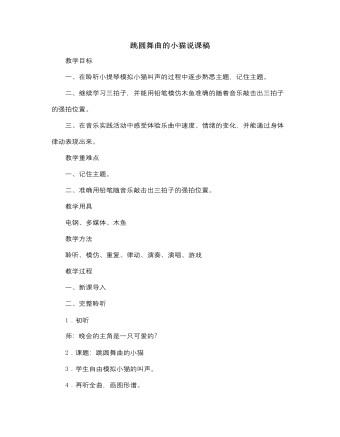
人音版小学音乐二年级上册跳圆舞曲的小猫说课稿
教学过程一、新课导入二、完整聆听1.初听师:晚会的主角是一只可爱的?2.课题:跳圆舞曲的小猫3.学生自由模拟小猫的叫声。4.再听全曲,画图形谱。师:观察图形谱,音乐有几部分组成?三、聆听A段1. 初听,找出模拟小猫叫声的音色。(集体聆听、律动)2. 再次聆听,个体检测3. 学唱A段主体旋律。(老师范唱主体旋律)4. 集体聆听并随音乐律动。5. 集体检测师:刚才唱的主题句放到音乐中你们能找到吗?如果找到了就跟着唱一唱。四、聆听第二乐段1. 初听师:它和第一乐段有联系吗?(找出相同和不同的地方)2. 复听师:速度、情绪和第一乐段比较起来有何不同?五、聆听B乐段1. 初听(教师随音乐律动)2. 复听,隋老师再次划图形谱。3. 师生用木鱼合作演奏。4. 小组合作表演。六、聆听第四乐段1. 初听师:和前面哪段音乐相似?2. 复听师:不同之处在哪?七、完整聆听学生和老师一起律动。
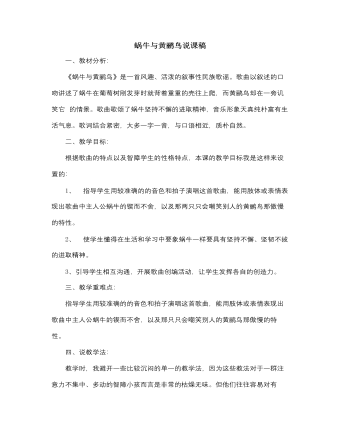
人音版小学音乐二年级上册蜗牛与黄鹂鸟说课稿
a.模仿老师一句一句地,有节奏地读歌词,注意老师手上的木鱼敲打的节奏。b.和老师一起把歌词读一遍,注意强调切分节奏的读法。c.学习歌曲:第一遍,老师一句一句地教学生唱,同时用电子琴弹出旋律。第二遍,老师一边一句一句地教唱,一边做出舞蹈动作,学生在下面模仿。d.学生听老师的电子琴伴奏,齐唱歌曲。2.歌曲演唱:演唱a.“有请我们班的小歌星子喻同学为我们演唱好不好?”b.“我们来组个乐团,怎么样?” c. “那我们的乐团起什么名字好呢?”“叽叽喳喳合唱团。”d. “现在老师宣布,我们的叽叽喳喳合唱团正式开演!”小结:“今天老师很高兴和同学们一起学习《蜗牛与黄鹂鸟》这首歌曲,老师看到了同学们的精彩表演,心里非常感动。在这里,老师希望同学们今后要像蜗牛一样,在学习上或者是生活上,不管遇到什么困难都勇敢面对,克服困难,坚持到底!同学们加油!
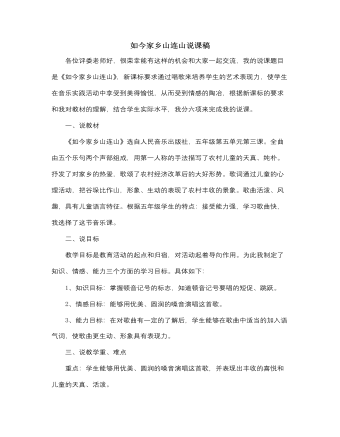
人音版小学音乐三年级上册如今家乡山连山说课稿
3、拓展要求:在学生对歌曲有了一定的了解之后,我会让学生在歌词中适当的地方加入语气词,使歌曲更生动、形象。例如:“妈妈告诉我,家乡没有山”这句歌词,显得有点惋惜和遗憾之情,我觉得用“唉”比较好,下面的就分组讨论。每小组派一个代表唱出自己组里填的语气词。在所有组里的语气词里选一组最好的,确定下来。全班一起演唱,并加上确定的语气词。唱歌比赛:将学生分4个组,一组高声部、一组低声部、一组加语气词、一组加打击乐器(如沙锤、双响筒、碰玲),增强他们的合作意识和合作默契。4、小结在课堂小结时我先安排了学生谈一谈这节课的感想,如:这节课你学到了什么?歌曲中你最喜欢那一句?而且对那些有创意的学生我还及时的发给他们小奖品。在本课的教学中我以表扬和鼓励为主,随时引导学生在音乐活动中开展自评互评和老师的随堂评价,以提高学生的乐感和审美能力。
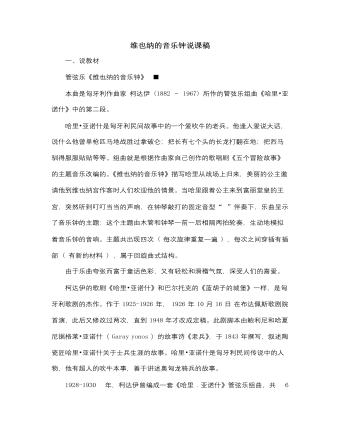
人音版小学音乐三年级上册维也纳的音乐钟说课稿
2. 讲小故事介绍:哈里?亚诺什设计意图:了解音乐创作北京,讲故事的形式很新颖,有趣,能调动学生的积极性。3. 初听乐曲 思考问题:? 在乐曲中你听到钟声了吗?钟声多还是少?还听到其他声音了吗?? 这首乐曲是由一种乐器演奏的,还是由很多乐器演奏的?? 对比上一部作品《灵隐钟声》,这首乐曲给你的感觉是什么?? 你觉得哈里?亚诺什来到了什么地方?森林 战场 王宫设计意图:学生能带着问题有目的的去聆听,然后学生根据问题谈自己的感受3. 介绍作曲家 柯达伊4. 聆听 主题音乐一共重复了几次?每一次都是连着的还是有别的内容?并且把相同的主题音乐用√来表示,不相同的用×来表示。设计意图:方法简单,通俗易懂。学生听辨后能较快作出选择。5. 介绍回旋曲式设计意图:了解曲式结构6. 用小铃铛在主题音调出现时为乐曲伴奏设计意图:用伴奏的形式来表演体现音乐
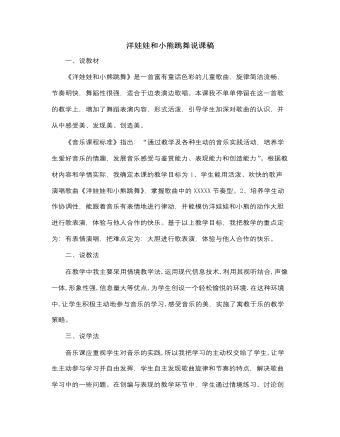
人音版小学音乐二年级上册洋娃娃和小熊跳舞说课稿
《洋娃娃和小熊跳舞》是一首富有童话色彩的儿童歌曲,旋律简洁流畅,节奏明快,舞蹈性很强,适合于边表演边歌唱。本课我不单单停留在这一首歌的教学上,增加了舞蹈表演内容,形式活泼,引导学生加深对歌曲的认识,并从中感受美、发现美、创造美。《音乐课程标准》指出:“通过教学及各种生动的音乐实践活动,培养学生爱好音乐的情趣,发展音乐感受与鉴赏能力、表现能力和创造能力”。根据教材内容和学情实际,我确定本课的教学目标为1、学生能用活泼、欢快的歌声演唱歌曲《洋娃娃和小熊跳舞》,掌握歌曲中的XXXXX节奏型。2、培养学生动作协调性,能跟着音乐有表情地进行律动,并能模仿洋娃娃和小熊的动作大胆进行歌表演,体验与他人合作的快乐。基于以上教学目标,我把教学的重点定为:有表情演唱,把难点定为:大胆进行歌表演,体验与他人合作的快乐。

